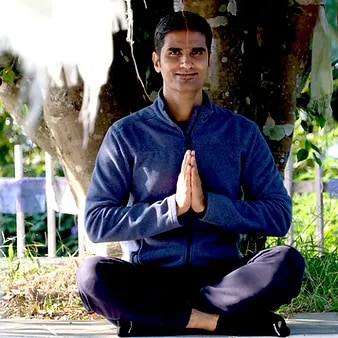How Practicing Yoga Can Help Cultivate Gratitude
by Hardik Mehta

In today’s fast-paced world, gratitude often gets overlooked in the quest for material success and the pressures of daily life. However, practicing gratitude has profound effects on mental, emotional, and even physical health. One way to strengthen this powerful habit is through the practice of yoga. Yoga, with its mindful movements, breathwork, and meditative components, provides a fertile ground for nurturing gratitude. It encourages mindfulness, self-awareness, and a deeper connection with the present moment, helping individuals shift their focus from what they lack to appreciating what they have.
In this blog, we will explore how practicing yoga can help foster a deeper sense of gratitude and well-being.
1.Yoga Fosters Mindfulness and Presence
Gratitude thrives when we immerse ourselves fully in the present moment. It’s easy to feel overwhelmed when our thoughts are constantly fixated on the past or future. Yoga, through its emphasis on breathwork and mindful movement, brings us back to the now. Poses like Mountain Pose (Tadasana) or Child’s Pose (Balasana) help anchor practitioners in the present moment, fostering a state of mindful awareness.
When you are fully engaged in your practice, focusing on your breath, the alignment of your body, and the sensations within, you become more attuned to your current experience. This attentiveness helps cultivate an appreciation for the little things—like the ability to breathe deeply or move with ease—instilling a sense of gratitude for the body’s capabilities and life’s small pleasures.
2.Increased Self-Awareness
One of yoga’s core teachings is to foster a deeper connection with oneself. As you move through asanas and focus on your breath, you begin to observe your thoughts, emotions, and physical sensations without judgment. This self-awareness helps you recognize patterns of negative thinking or self-criticism, allowing you to consciously shift toward a more positive, grateful mindset.
Yoga reminds us that we are whole and complete just as we are. This acceptance encourages practitioners to appreciate their bodies, minds, and emotions. By developing self-awareness through yoga, individuals can learn to be kinder to themselves, embracing their strengths and limitations alike with gratitude.
3.Breathwork Cultivates a Grateful Mindset
In yoga, breathwork or Pranayama is essential for calming the mind and connecting to a deeper sense of awareness. Breath serves as a bridge between the body and mind, making it easier to enter a state of relaxation and mindfulness.
For instance, practicing Ujjayi Breath (Victorious Breath) helps reduce stress and brings about a sense of calm, enabling you to appreciate the simplicity of the breath itself. When you take time to breathe deeply and focus on this life-giving process, it becomes easier to experience gratitude for your body’s natural functions, which often go unnoticed.
4.Gratitude Meditation Through Yoga
Many yoga classes end with a short meditation, often in Savasana (Corpse Pose), which is an excellent opportunity to reflect on what you are grateful for. Whether it’s acknowledging the strength you displayed during your practice, the beauty of your surroundings, or the support of your yoga community, these moments allow you to cultivate gratitude consciously.
Incorporating gratitude meditations into your practice can deepen your sense of appreciation for the present moment. By sitting quietly and reflecting on your day, your loved ones, or even the challenges you have overcome, you create space for gratitude to emerge naturally.
5.Yoga Helps Overcome Challenges with Gratitude
The physical practice of yoga often presents challenges, whether it’s mastering a difficult pose or holding a posture for an extended period. These challenges mirror the obstacles we face in life. However, yoga teaches us to approach difficulties with patience and self-compassion, fostering resilience.
When you learn to approach challenges with grace on the mat, this mindset translates off the mat as well. Instead of seeing obstacles as burdens, you begin to view them as opportunities for growth, encouraging a mindset of gratitude. Even when life throws curveballs, yoga helps you stay grounded and maintain an attitude of appreciation for the lessons learned along the way.
6.Yoga Encourages Gratitude for Community
Yoga is often practiced in a group setting, whether in a studio or outdoor space, which creates a sense of belonging and community. Practicing alongside others fosters connection and shared energy, which can deepen your gratitude for the support and love within the yoga community.
Being part of a yoga community also reminds us of the importance of human connection and support. In a world where individualism is often prized, yoga helps us appreciate the collective experience of growth, struggle, and transformation, fostering a sense of gratitude for the people who journey alongside us.
7.Connecting Body, Mind, and Spirit
Yoga’s holistic approach connects the body, mind, and spirit, providing a sense of wholeness and well-being. This integration creates space for gratitude to flourish as you become more in tune with every part of yourself. Whether it’s the physical strength you develop through your asanas, the mental clarity you gain from pranayama, or the emotional release you experience during meditation, this unity encourages gratitude for the whole experience of being alive.
8.Gratitude Journaling Post-Yoga Practice
Many practitioners find that journaling after a yoga session is an effective way to integrate gratitude into their practice. After a session, your mind is often clearer, and your body feels more at ease. This is the perfect time to reflect on what you’re grateful for, whether it’s the practice itself, a specific pose you mastered, or the simple fact that you showed up on the mat.
Keeping a gratitude journal can serve as a reminder to focus on the positive aspects of life, further enhancing the benefits of both yoga and gratitude.
Sayujya Yoga: Cultivating Gratitude Through Authentic Practice
At Sayujya Yoga, the focus is not only on the physical benefits of yoga but also on cultivating a mindful, grateful approach to life. We offer 200 Hours Teacher Training Courses (TTC) and Yoga Teacher Training Courses in Mumbai, designed to instil the ancient philosophies of yoga while blending contemporary practices. Our courses help students develop both the physical and mental tools needed to build a mindful yoga practice that fosters gratitude.
Whether you are interested in deepening your own practice or becoming a certified yoga instructor, Sayujya Yoga provides the best yoga TTC and training courses in Mumbai. We offer classes in Ghatkopar East, with specialties in Yin Yoga, Ashtanga Vinyasa, and Vinyasa TTC. Join us to discover how yoga can help cultivate mindfulness, gratitude, and holistic well-being.
Incorporating yoga into your daily routine can be a powerful tool for cultivating gratitude. Through mindfulness, breathwork, and meditation, yoga helps us become more aware of the present moment and appreciate the blessings we often overlook. It teaches us to approach challenges with grace, appreciate our bodies, and connect with others in meaningful ways.
By practicing yoga regularly, you will find yourself naturally shifting into a mindset of gratitude, not just for the practice itself but for all aspects of your life.
About the Author

Hardik Mehta
Hardik is an E-RYT 500 & YACEP (Yoga Alliance Continuing Education Provider), Yoga Alliance, USA. He has been practicing yoga for the last 9 years. Prior to finding his true calling in Yoga, he was working with various corporates for 12 years in the Retail and eCommerce sector.
